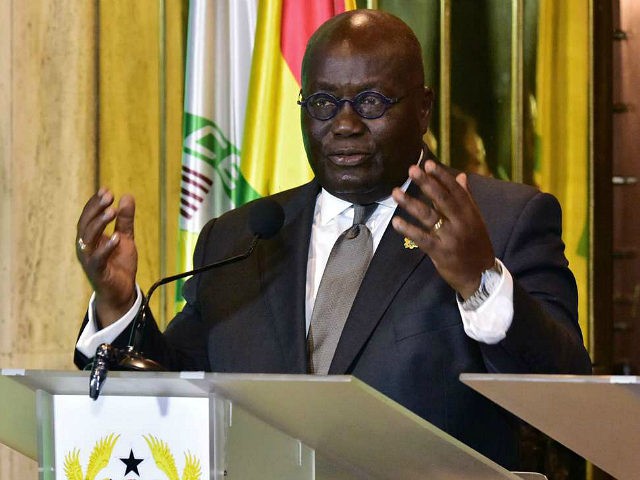Ghanaian President Akufo-Addo called Nigerian President Muhammadu Buhari on Tuesday to apologize for the unceremonious demolition of the country’s embassy in Accra by a local businessman claiming to own the land.
Pulse Nigeria reported that a Ghanaian businessman claimed the Nigerian High Commission was situated on his land and provided evidence of his claim to the local authorities. The embassy petitioned the government to block the demolition, but received no response.
As per international law, embassies are considered the sovereign territory of the states they represent, meaning the Nigerian embassy would be considered Nigerian land. Ghana has a legal responsibility to protect the embassy and can only do away with it through the legal process of declaring Nigeria’s diplomats personae non grata, then formally withdrawing the diplomatic presence.
“The receiving State is under a special duty to take all appropriate steps to protect the premises of the mission against any intrusion or damage and to prevent any disturbance of the peace of the mission or impairment of its dignity,” Article 22 of the Vienna Convention, which governs the treatment of embassies, reads. “The premises of the mission, their furnishings and other property thereon and the means of transport of the mission shall be immune from search, requisition, attachment or execution.”
The facility’s head of security, Emmanuel Kabutey, said when police officers arrived at the scene, they did nothing to stop the demolition, which targeted a number of buildings under construction for embassy employees. Nigeria’s Charge D’affaires Iva Denoo was told she would need to leave the building or be bulldozed inside.
“When the police came, with the bulldozer outside, they had a friendly chat with the leader of the bulldozing team, exchanged phone numbers with him, and allowed him to go,” he told local media.
The demolition predictably drew a furious response from Nigeria, one of the most powerful countries in Africa due to its large military and population of nearly 200 million people, which condemned it as an unprovoked “act of aggression.”
“We strongly condemn two outrageous criminal attacks in Accra, Ghana, on a residential building in our diplomatic premises by unknown persons in which a bulldozer was used to demolish the building,” said Geoffrey Onyeama, Nigeria’s minister of foreign affairs. “We are engaging the Ghanaian Government and demand urgent action to find the perpetrators and provide adequate protection for Nigerians and their property in Ghana.”
We strongly condemn two outrageous criminal attacks in Accra, #Ghana, on a residential building in our diplomatic premises by unknown persons in which a bulldozer was used to demolish the building.
— Geoffrey Onyeama (@GeoffreyOnyeama) June 21, 2020
The shocking incident was seized upon by Ghana’s minority in Parliament, who released a statement describing themselves as “appalled and deeply embarrassed” by the demolition and accusing it of taking place “under the full protection of state security.”
“The Minority forcefully condemns, in no uncertain terms, this reckless act of aggression which violates international law and gravely undermines Ghana’s longstanding diplomatic relations with Nigeria,” the statement read. “The Government of Ghana must not underestimate the implications of this reckless act of unprovoked aggression not only for Ghana-Nigeria relations but also the negative reverberations in larger diplomatic quarters.”
On Tuesday, Ghanaian President Akufo-Addo called President Buhari to apologize for the incident and pledged to bring the culprits to justice.
“Pres Nana Akufo-Addo of Ghana today spoke with Pres Buhari, expressing his sincere apology for the demolition of a building on the premises of Nigerian High Commission in Accra, Ghana,” the Nigerian government wrote on Twitter.
STATE HOUSE PRESS RELEASE
GHANAIAN PRESIDENT TENDERS APOLOGY FOR DEMOLITION, ORDERS INVESTIGATION
Pres Nana Akufo-Addo of Ghana today spoke with Pres Buhari, expressing his sincere apology for demolition of a building on the premises of Nigerian High Commission in Accra, Ghana.
— Presidency Nigeria (@NGRPresident) June 23, 2020
Relations between the two countries, which represent two of Africa’s largest economies, have in recent years been anything but smooth. As noted by the BBC, a dispute last year over the status of foreign traders led to the temporary closure of some Nigerian-owned businesses. Another source of tension centered around Nigeria’s decision to close its border with Benin in a supposed attempt to crack down on smuggling, but which had a considerable impact on Ghanaians and other foreign traders across the region.
Follow Ben Kew on Facebook, Twitter at @ben_kew, or email him at bkew@breitbart.com

COMMENTS
Please let us know if you're having issues with commenting.